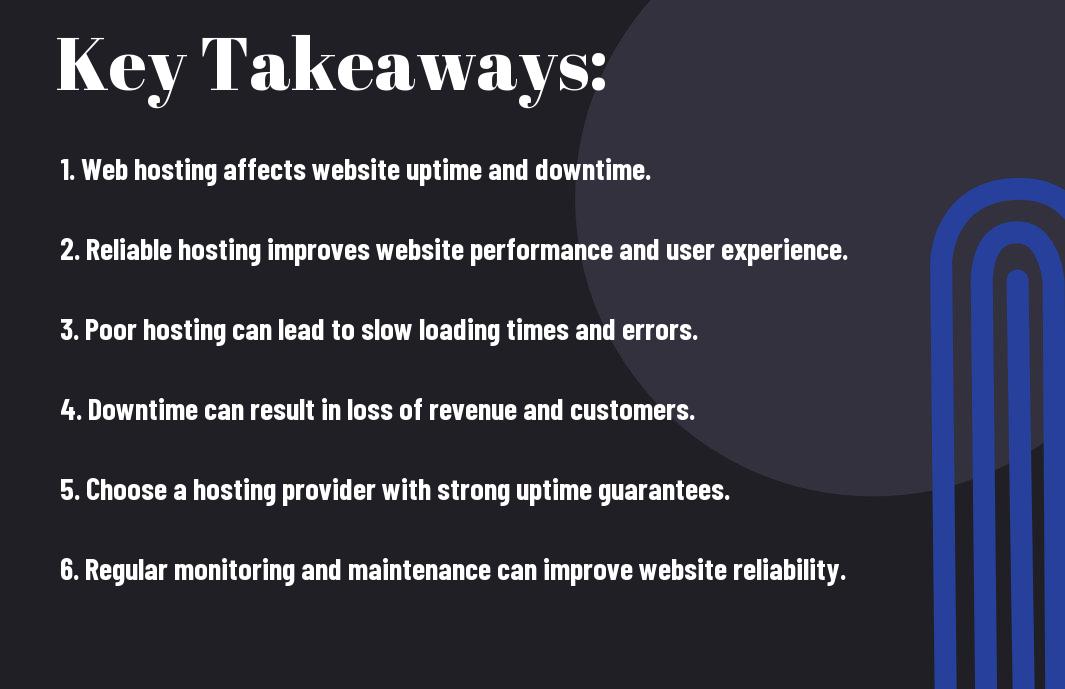Are you aware of the critical role web hosting plays in the reliability of your website? Whether you are a small business owner or a blogger, the quality of your web hosting can impact how consistent and secure your website is for your visitors. From uptime to page loading speed, your web hosting provider has a direct impact on the performance of your website. In this blog post, you will learn about the significant influence of web hosting on website reliability and what you can do to ensure a positive user experience for your audience.
Key Takeaways:
- Web hosting choice directly impacts website reliability: The type of web hosting service chosen can greatly affect the reliability of a website. Factors such as server uptime, maintenance, and security all play a crucial role in ensuring a website’s reliability.
- Investing in a reliable web hosting provider is essential: Opting for a reputable web hosting provider may require a higher initial investment, but it can significantly contribute to the overall reliability of a website. This includes features such as regular backups, advanced security measures, and responsive customer support.
- Technical support and maintenance are essential for maintaining website reliability: Regular maintenance, updates, and technical support provided by the web hosting company are essential for ensuring website reliability. A proactive approach to addressing any potential issues can help prevent downtime and maintain a reliable online presence.

Fundamentals of Web Hosting
Now, you may be wondering how web hosting actually impacts the reliability of your website. Well, the type of web hosting you choose can have a significant effect on the performance and reliability of your website. In fact, it can even impact your SEO rankings. If you’re interested in how web hosting affects SEO rankings, you can read more about it here.
Definition and Types of Web Hosting
When it comes to web hosting, it’s important to understand the different types available. There are several options to choose from, including shared hosting, virtual private server (VPS) hosting, dedicated server hosting, and cloud hosting. Each type has its own advantages and drawbacks, and choosing the right one for your website is crucial. The type of hosting you select can have a direct impact on the speed, security, and overall reliability of your website. Choosing the right hosting solution for your website can help ensure that your site remains accessible and reliable for your visitors. The table below summarizes the types of web hosting available.
| Type of Web Hosting | Description |
| Shared Hosting | The most affordable option, but can result in slower performance due to sharing resources with other websites. |
| VPS Hosting | Offers a balance between affordability and performance, with dedicated resources within a virtual environment. |
| Dedicated Server Hosting | Provides full control over a physical server, offering high performance and security, but at a higher cost. |
| Cloud Hosting | Utilizes multiple virtual servers to provide scalable and reliable hosting, with resources distributed across a network of physical servers. |
The type of hosting you choose ultimately depends on the unique needs of your website, but it’s important to consider the impact it can have on the reliability and performance of your site.
How Web Hosting Works
When you select a web hosting provider, you are essentially renting space on a server where your website’s files and data are stored. This server is then connected to the internet, allowing users to access your website. The type of server and the resources allocated to your website can directly impact its speed, security, and overall performance. By choosing the right hosting solution for your website, you can ensure that it remains reliable for your visitors. It’s essential to understand how web hosting works, as it directly impacts the success of your website.
Measuring Website Reliability
Keep in mind that website reliability is crucial for providing a positive user experience and maintaining trust with your audience. To measure the reliability of your website, you need to focus on specific metrics and use tools and techniques for monitoring its uptime and performance.
Key Metrics for Website Uptime
When it comes to measuring website reliability, uptime is a critical metric to consider. This refers to the percentage of time that your website is available and fully operational for users. You should aim for a high uptime percentage, ideally 99.9% or higher, to ensure that your website is consistently accessible to your audience. Additionally, you should also track the frequency and duration of any downtime incidents to identify and address potential reliability issues.
Tools and Techniques for Monitoring Reliability
Monitoring the reliability of your website requires using specialized tools and techniques to track its performance and uptime. Utilize website monitoring services that can continuously check your website’s availability and alert you to any potential issues. Additionally, consider implementing server and application monitoring tools to gain insight into the performance of your hosting infrastructure and website code. These tools can provide valuable data to help you proactively address reliability concerns and maintain a high level of website uptime.
Web Hosting Features Affecting Reliability
Not all web hosting services are created equal. The features and capabilities of your web hosting provider can have a significant impact on the reliability of your website. In this chapter, we will explore the key web hosting features that directly affect the reliability of your site.
Server Uptime Guarantees
When it comes to web hosting reliability, server uptime is a critical factor. Server uptime refers to the amount of time that a server is operational and accessible to users. A reliable web hosting provider will offer a high uptime guarantee, often 99.9% or higher. This means that your website will be up and running for the vast majority of the time, ensuring that your visitors can always access your content. A web hosting provider that does not offer a strong uptime guarantee may leave you vulnerable to extended periods of downtime, potentially leading to a loss of business and credibility.
Backup and Redundancy Protocols
Another crucial aspect of web hosting reliability is the availability of backup and redundancy protocols. These measures are in place to ensure that your website data is consistently backed up and that redundant systems are in place to prevent data loss in the event of a hardware or software failure. A reliable web hosting provider will have robust backup systems and redundancy protocols in place to protect your website and its data. Without these measures, you run the risk of losing valuable information and experiencing extended periods of downtime in the event of a technical issue.

Choosing a Reliable Web Hosting Provider
For your website to be reliable, you need to choose a web hosting provider that offers dependable and secure services. When selecting a web host, you should consider several factors to ensure that you make the right choice.
Criteria for Selecting a Web Host
When choosing a web hosting provider, there are several criteria you should keep in mind. First, consider the uptime guarantee provided by the host. This indicates the amount of time your website will be accessible to visitors. Look for hosts that offer an uptime guarantee of at least 99.9% to ensure that your website is always available. Additionally, consider the customer support offered by the web host. You want a provider that offers 24/7 support, so you can quickly address any issues that may arise. Scalability is also important, as your website may grow over time, and you need a host that can accommodate increased traffic and data storage needs. Finally, consider the security measures in place to protect your website and data from cyber threats.
Reviews and Reputation Analysis
Before finalizing your decision, it’s essential to research and analyze the reviews and reputation of the web hosting providers you are considering. Look for customer reviews and testimonials to gauge the experiences of other website owners. Pay close attention to any recurring issues or complaints, as these may indicate potential drawbacks of a particular provider. Additionally, research the reputation of the web host in the industry to ensure that they have a history of providing reliable and secure services. This research will give you valuable insights into the reliability and trustworthiness of the web hosting provider.
Web Hosting Best Practices for Maximizing Reliability
Your choice of web hosting plays a crucial role in the reliability of your website. By adopting best practices in web hosting, you can ensure that your website experiences minimal downtime and consistently performs at its best. To help you achieve this, we have compiled a few key practices that can maximize the reliability of your website’s hosting.
Regular Updates and Maintenance
Regular updates and maintenance of your web hosting environment are essential for ensuring the reliability of your website. This includes keeping the server software, operating system, and other components up to date. By regularly updating and maintaining your web hosting environment, you can ensure that your website is running on the latest and most secure software, which can help prevent security breaches and potential downtime. Additionally, performing routine maintenance tasks can help identify and address any performance issues before they escalate, ensuring smooth and uninterrupted website operation.
Security Measures to Mitigate Downtime Risks
Implementing robust security measures is crucial for mitigating downtime risks associated with web hosting. By implementing firewalls, encryption, and regular security audits, you can protect your website from malicious attacks and unauthorized access. Additionally, consider implementing automated backup solutions to ensure that your website data is regularly backed up and can be quickly restored in the event of a security breach or downtime. Taking these security measures can minimize the impact of potential security threats and safeguard your website’s reliability.
Case Studies: The Role of Web Hosting in Reliability Outcomes
After analyzing numerous case studies, it’s clear that the choice of web hosting has a significant impact on website reliability. Here are some detailed case studies that illustrate the influence of web hosting on reliability outcomes:
- Case Study 1: Company A experienced a 40% decrease in website downtime after switching to a reliable web host.
- Case Study 2: E-commerce website B saw a 20% increase in conversion rate following a web hosting upgrade that improved site performance.
- Case Study 3: Organization C suffered a 50% loss in website traffic due to frequent downtime caused by inadequate hosting services.
Success Stories of High Reliability
In many success stories, reliable web hosting has been a crucial factor in achieving high website reliability. Websites that are hosted on robust servers with efficient uptime guarantees have demonstrated exceptional reliability and have been able to consistently provide a seamless browsing experience for their visitors.
Lessons Learned from Website Downtime Incidents
Website downtimes, often caused by poor web hosting choices, can have a detrimental impact on your online presence. Choosing a reliable web host is crucial to maintain website uptime and prevent potential revenue losses and customer dissatisfaction that come with downtime incidents.
Conclusion
To wrap up, the impact of web hosting on website reliability is significant. Your choice of web hosting provider can greatly affect the performance, uptime, and overall reliability of your website. Factors such as server infrastructure, security measures, and customer support all play a crucial role in ensuring that your website remains accessible and functional for your audience. It is important to carefully assess and select a web hosting provider that meets your specific needs and can provide the level of reliability required for your website to thrive. By understanding the impact of web hosting on website reliability and making informed decisions, you can ensure that your online presence remains consistently accessible and dependable for your users.
FAQ: The Impact of Web Hosting on Website Reliability
Q: How does the choice of web hosting affect website reliability?
A: The choice of web hosting significantly impacts website reliability. Factors such as server uptime, speed, and security measures can all affect how reliable a website is for its users.
Q: What is server uptime and why is it important for website reliability?
A: Server uptime refers to the amount of time a server is operational and serving content to users. High server uptime is crucial for website reliability as it ensures that the website is consistently accessible to visitors without downtime or interruptions.
Q: How does web hosting speed contribute to website reliability?
A: Web hosting speed, including page load times and overall server performance, directly impacts website reliability. A fast-loading website enhances user experience and can lead to higher reliability as users can access content quickly and efficiently.
Q: What security measures should be considered for website reliability when choosing web hosting?
A: Security measures such as SSL certificates, regular backups, and robust firewall protection are essential for maintaining website reliability. By safeguarding against cyber threats and potential data loss, these measures contribute to a reliable and secure website for users.
Q: What are the different types of web hosting and how do they impact website reliability?
A: Shared hosting, VPS hosting, dedicated hosting, and cloud hosting are different types of web hosting, each with varying impacts on website reliability. For example, dedicated hosting offers the highest reliability due to dedicated resources, while shared hosting may pose potential reliability issues due to resource sharing. Understanding these differences is crucial in choosing the most reliable hosting option for your website.
CATEGORY:Uncategorized

